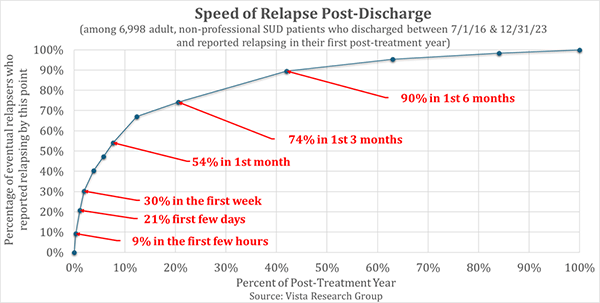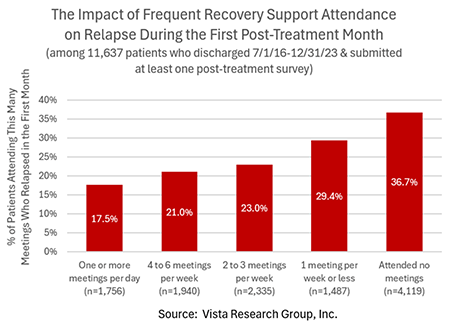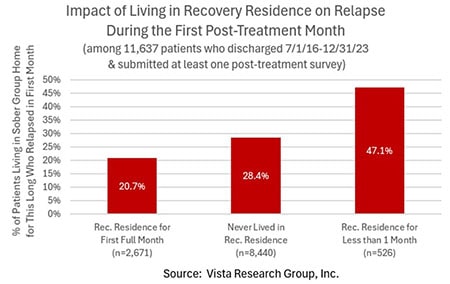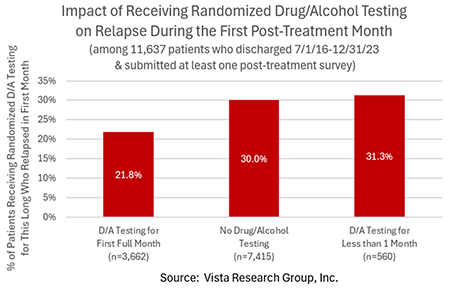My son returns home from rehab next week. He’s confident he’ll be able to stay sober, but I’m worried. All of his stressors (a precarious job, a custody battle with his ex-wife, financial problems, etc.) are still there. Is there anything we can do to help him stay sober?
Hi Worried,
You’re right to be concerned. Our research shows that almost two-thirds (64%) of people who go to addiction treatment will be back using alcohol and/or drugs one year later. You should also be aware that more than half of the adults who relapse during the year (54%) will relapse in their first month after treatment:

These statistics are even worse for some patients. Among patients who leave treatment against the advice of their clinician, 69% will relapse within the first month and 47% will relapse within the first week! Relapse rates are similarly scary for adolescents, with 41% relapsing within the first week and 70% within the first month.
The good news is that if your son can remain sober throughout his first post-treatment month, he’s got a good chance of remaining so long-term. So a good question to ask is:
What can our son do to increase the likelihood he remains sober throughout the first month after treatment?
Our research points to three things that dramatically increase the odds an individual will be able to remain sober after treatment:
Being active in AA, NA, Smart Recovery or other recovery support communities. Your son needs the support of others who know what he’s going through. He also needs to make new friends who can help him learn to enjoy a life without alcohol and drugs. Strongly encourage your son to find recovery meetings he enjoys and to attend them religiously. Our research shows a direct correlation between how frequently someone attends recovery support meetings in the first month and how likely they are to still be abstinent one month after treatment:

Please note that patients who relapsed and never submitted any post-treatment surveys aren’t included in the above chart or either of the two charts below. Therefore, the real relapse rates are substantially higher than these charts indicate. If there was a way to determine how many recovery support meetings (if any) the patients who quickly relapsed attended, it’s likely this would further increase the spread between those who took strong actions to aid their recovery and those who didn’t.
Living in a supportive recovery residence. Having your son live in a NARR-approved sober living home is a great way to help him focus wholeheartedly on his recovery. A well-run home will provide structure to his days, make sure he attends recovery support meetings, randomly test him for alcohol and drugs and help him move forward in his new substance-free life. I’m a big believer in the effectiveness of sober living, and the following chart shows why:

- Agreeing to randomized drug and/or alcohol testing. Finally, I recommend you ask your son to agree to be randomly tested for his primary drug of choice and any other substances he might be tempted to use. Knowing that he’s unlikely to be able to hide his use decreases the likelihood he’ll relapse in his first post-treatment month:

One final point. It’s important to stick with the interventions your son selects for at least several months. As you can see above, relapse rates for individuals who leave a sober living home in less than a month are more than double those for people who remain one month or longer. Of course, some people who left in the first month may have been kicked out for using. However, others probably relapsed after they left sober living when they realized they were suddenly free from all oversight.
The first month after rehab is a crucial turning point—one that can set the stage for long-term success or spiral quickly back down into destructive substance use. With the right support, your son can build a future free from addiction—one step, one day at a time. I wish you both strength and success during this pivotal time.
Joanna

